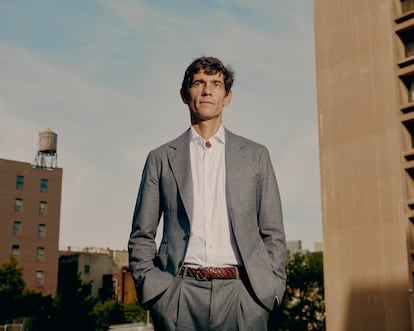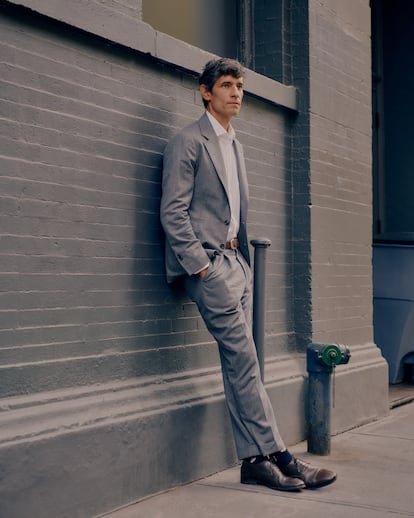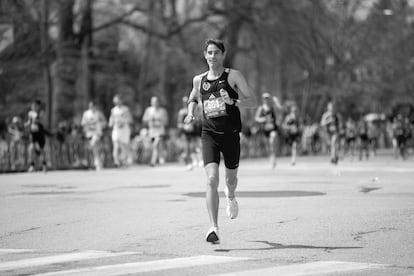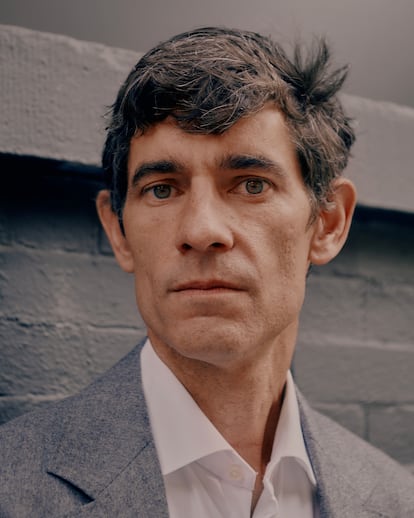Nicholas Thompson: ‘My view on journalism is that you shouldn’t create content to please the algorithms’
The CEO of ‘The Atlantic’ — one of the most influential media outlets in the United States — runs non-stop. Not only in his professional career, but also in his sporting career. In 2021, he broke the 50-kilometer record for runners over 45-years-old. But above all, Thompson has been – and is – a journalist. And a good one, both from his laptop and from his role as a manager. He is also a detailed analyst of the media and its relationship with technology and AI

Every day after work, Nicholas Thompson runs off. Literally.
When he’s done for the day, Thompson — CEO of the influential magazine The Atlantic — puts on his exercise clothes and runs the five miles that separate the editorial office from his home in Brooklyn. That’s where he lives with his wife — New School professor and dance history expert Danielle Goldman — and their three teenage children.
In the morning, he does the same thing. He jogs across the Brooklyn, Williamsburg, or Manhattan bridge — depending on what he feels like — and, while “dodging delivery trucks or jumping over boxes of mushrooms on Canal Street,” he continues to the office through the streets of the city he wakes up to. He showers, puts on one of the suits that — fresh from the dry cleaners — hangs behind his desk and gets to work.
On the stifling summer day when he received EL PAÍS, he had skipped his routine. That morning, he had to attend a photo shoot instead. The interview — which took place in a spacious office at the magazine’s New York headquarters, in the heart of Soho — was recently completed by email, when Thompson answered questions about the consequences for the United States (and for The Atlantic) that will follow Donald Trump’s return to the White House.
A graduate in Earth Sciences, Politics and Economics, Thompson, 49, has been a folk guitarist, an employee at a computer company, a freelance reporter in Africa and the founder of a couple of websites. He was also the editor of a DC-based publication, The New Yorker website — whose digital readership he helped multiply — and Wired, which he ended up directing before making the jump to the other side and becoming one of the most successful media executives in the United States. In just three years, he has managed to bolster the business of The Atlantic — a publication founded in 1857 that has recently seen its influence on the American political scene grow. In April 2024, it returned to profitability after surpassing one million subscriptions. Then, six months later, the company announced something unprecedented in this era of the decline of paper: for the first time in two decades, starting in January 2025, it will start publishing 12 print issues a year, instead of the current 10.

Thompson also has a newsletter on LinkedIn — his “favorite” social media network — with almost 475,000 subscribers. He recommends readings, mainly related to technology. Additionally, he’s the author of an essential book on the Cold War — The Hawk and the Dove (2009) — about the relationship between his grandfather, Paul Nitze (the anti-Soviet hawk of the title) and the diplomat George Kennan (the dove), who was the father of the doctrine of containment, so as to prevent the advance of communism.
In all these years, Thompson has never stopped running. An accomplished marathoner, in 2021, he set the American record in the 50k for the 45-49 age group. He still holds it. As if that weren’t enough, in his spare time — that is, “between six and seven in the morning, on weekends and sometimes at night” — he’s working on a book about the loneliness of the long-distance runner, which he hopes to publish in 2026.
Question. Do you ever think — after a particularly hard day — “Why not, maybe I’ll take an Uber back home today?”
Answer. Never. Something like [today’s photoshoot] has to happen, or maybe I have an event [to get me to skip my run]. I started running to work about 20 years ago, in my early days at Wired. Condé Nast’s offices were in Times Square, about eight miles from my home. I figured that, if I ran, it would take me just a little longer than if I took the subway. Back then, I would bicycle one way, because it was too much to run both ways. But now that I live closer [to my office], it’s more reasonable: eight to 10 miles, round trip. That’s about how much I like to run per day.
Q. Does running also help you exercise your mind?
A. Running is like meditation. A space for tranquility and reflection. When you have three children and certain work obligations, it’s not easy [to find that space]. When you compete or train, you concentrate on your body and mind for two, three hours. Sometimes up to five or six. The process of maintaining attention during a long and intense work meeting isn’t exactly the same, but it’s similar. Also, running teaches you that, with training, you improve. If you apply that idea to your job, it undoubtedly helps. It’s also allowed me to develop confidence and become aware of myself. The good thing about this sport is that you are your only rival. Success comes from setting a goal and achieving it.
Q. You grew up in Boston, with its famous marathon. And you began running during the years in which great runners like Carl Lewis and Ben Johnson emerged. Did these factors spark your passion?
A. I started running at the age of five, with my father. It must have been at that age, because when I was six, he moved to Washington after divorcing my mother. Then, I stopped. I took it up again in high school, when I realized I wasn’t bad at it. When I was in college, at Stanford, I dropped out again; I wasn’t up to par with the team. Then, I took it up again.
More than Boston, the real deal was that — like so many other people who put on running shoes — I was kicked off the basketball team. I took refuge in that other sport. Both of my grandfathers were also very athletic. My father was a boxing champion. My mother’s father [the hawk, Nitze] was also very athletic, in a different way. We played tennis, skied, fished... I grew up with my mother and my sisters, but I had these different models of masculinity.

Q. In his book about running, the novelist Haruki Murakami writes that he would like this phrase on his grave: “At least he never walked.” What would you like as an epitaph?
A. That I was a good father.
Q. Murakami is a big jazz fan. Do you have any other hobbies?
A. Playing guitar. In my twenties, I developed a bit of a career as an acoustic folk soloist. I even released a few records. They’re on Spotify [under the name Nick Thompson].
Q. Maybe we should organize a reunion tour…
A. [Laughs] I don’t know if I would manage to find any of my few fans from back then!
Q. Your grandfather was one of the architects of American foreign policy during the Cold War. He was a genuine Washington hawk. What was he like at home?
A. Just wonderful. Generous and kind. He was a great role model, whose best life lesson was: pick something you believe in, do your best to master the subject, work hard to bring your vision to bear, and be a good person to everyone, even if you argue fiercely. That was part of the reason I wrote the book about him and Kennan. They disagreed on almost everything, but they were friends.
Q. Friendly, but aggressive during arguments… is that how you are as a boss?
A. I hope I’m a bit like my grandfather. I may be more inclined to seek consensus. If I have one skill, it’s to identify other people’s strengths and combine them. So, I may be more conciliatory in my leadership style than he was. I also rely on being reasonably warm and friendly.
Q. Do you remember what he thought when he saw the Berlin Wall fall?
A. I think he felt vindicated. His great goal in life was to prevent a nuclear war from breaking out. Many thought that his policies were taking us dangerously close to that.
Q. And did he believe in Francis Fukuyama’s theory that the fall of the Iron Curtain would bring about the end of history?
A. I don’t think so. Kennan foresaw that a Putin would eventually loom on the horizon, that Russia would never align itself with the West. I suspect my grandfather agreed with him.
Q. When did you decide to become a journalist?
A. I remember when I decided I would try to be one. I was 24. I worked for a couple of years at a magazine in Washington. I wrote some good stories, but then I realized I wasn’t bright enough. I wasn’t getting enough exclusives and I wasn’t writing that well. As a reporter, it’s important to have a nose for issues, and I felt I was lacking in that. For example, I was convinced that a book about [disgraced Democratic politician] Eliot Spitzer would be a good idea. I thought he would be president. Obviously, I was wrong. Anyways, I was 30-years-old and about to go to law school. The idea for the book about my grandfather came up and there was an opportunity to work as an editor at Wired. I decided to take both paths.
Q. The magazine you used to run was the unofficial bulletin of Silicon Valley. You know that world intimately. Are you surprised by the direction that technology companies are taking?
A. My view of them hasn’t changed much. I never thought [the leaders of the tech industry] were as good as many people thought. I also don’t think they’re as bad as many people think, either. I studied at Stanford, the university where Google was born. And I always saw Silicon Valley as a mix of people capable of incredible things, with some deplorable behavior.
Q. Could the media have done more to expose what these companies were doing in plain sight?
A. I think [many media outlets] weren’t too critical… and, at the same time, others were too critical. I became editor of Wired in 2017, just as the narrative about Silicon Valley began to change. This was after Trump’s election, with the Cambridge Analytica and Facebook scandal. I thought that all these very smart people — who work at the magazine, who are so passionate about technology — should investigate these companies. One of the problems with the rest of the coverage is that there was too much animosity. It happens today with artificial intelligence. The terrible things about the phenomenon are reported much more than the positive things.
Q. Isn’t the media too dependent on these companies? What will happen when tech firms decide that they no longer need their content?
A. I don’t agree with people who say that the media shouldn’t partner with technology companies. There are good and bad partnerships. There are news companies that, just a few years ago, invested a lot of money when Facebook told them that it would pay for creating videos. They hired people who then had to be fired. The mistake was believing that the money would continue to come indefinitely; they didn’t understand that Facebook is a capitalist company that will invest if it thinks there’s a market opportunity and will stop when there isn’t.
My view on journalism is that you shouldn’t create content to please the algorithms. You shouldn’t assign stories just because you think they’ll do well on Facebook, or you think they’ll do well on Google. You should assign the stories you think are the right stories to assign [to specific reporters].
Q. Was it a big change going from running a magazine to being CEO?
A. Not really. I had worked in things like consumer strategy and subscriptions, product engineering, brand building… but I had never sold advertising. The interesting thing about this position is that I’ve added fewer tasks than I’ve taken away. For example, I didn’t know what was in [the current] issue until I saw it in print. I have no idea what we’re going to publish… we maintain a separation between the editorial and the business side of things that’s quite old-fashioned. That’s why we don’t even work on the same floor.

Q. The success of your magazine is almost the only good news within a sector that’s under siege in the United States. How did you achieve this?
A. There’s the strategic plan. [Thompson points to the wall, where there are a handful of colorful sticky notes].
Q. It cannot be so easy…
A. Basically, it consisted of two parts: the first, getting as many subscribers as possible, while trying out different strategies to achieve this. One of the advantages of having spent so much time in Silicon Valley is that you learn a lot about how this works. How many and what kind of stories will someone read? Let’s try charging $79. Then $69. What color should the subscription box be? At what time do we send out the newsletters? We experimented. The most important thing was to figure out how to reinforce the paywall without losing advertising revenue. That’s how we went from losing subscribers, to eventually exceeding a million. And the amount they pay, on average, has increased substantially.
Q. The Atlantic is one of the success stories they study in business schools.
A. We were losing about $20 million a year. And now, we’re making a profit. Let’s see if we can keep it up. Another thing we changed was our advertising: we managed to generate more revenue, at a lower cost. We also cut costs by being smart about new hires; that’s where we saved money. We’re not an NGO, but we’re owned by a very rich person [Laurene Powell Jobs, the widow of Apple founder Steve Jobs] who wants to make the world a better place. But we’re a business and we have to be profitable.
Q. What’s your relationship like with Laurene Powell Jobs?
A. She’s incredibly smart, intuitive and focused. She doesn’t wake up worried about how The Atlantic is doing, because she has other more important and urgent things. But when she has a question or a suggestion, she’s good. And when she shares insight, it’s spot on.
Q. Does she ever get involved in the journalistic side of things?
A. If she ever did, I wouldn’t know, because — as I was just saying — I’m not involved in that.
Q. Can you imagine a future without print editions?
A. No. And even less so now that we don’t know what’s going to happen with AI. But a print edition is something you can control. It’s a very good hedge against over-dependence on technology platforms. Magazines are great and they’re not that expensive to print. The reason I took this job was also because of The Atlantic’s impressive past. It seemed like a worthwhile mission: to help stabilize the business and ensure that this publication — which was founded so long ago by, among others, Ralph Waldo Emerson — continues to exist.
Q. What’s the purpose of this magazine 167 years after Emerson?
A. To provoke debate. To give people ideas that stimulate thought and allow them to discuss and understand what’s happening in the United States and [around] the world. Ideally, to help society become smarter and make better decisions.
Q. What will a second Trump term mean for the media landscape in the United States and how does The Atlantic plan to deal with four more years of him in the White House?
A. The Atlantic has always thrived in times of tension and whenever this country is trying to understand itself. Our newsroom’s coverage in the run-up to the 2024 elections was exceptional. I imagine that, in the next four years, our work will shine and serve to inform the opinion of our fellow citizens.
Q. That ideal of placing journalism at the center of the public discourse… is this compatible with charging for online content?
A. Before the internet, you always had to pay. Then, there was a brief interlude — an anomaly — when you could read everything for free online. Journalists and companies thought they could monetize [content] through digital advertising. But that, by and large, didn’t work. If you ask me if we should have a paywall, I’ll say: absolutely. It may make our stories less circulated, but there’s a business to sustain. And when people subscribe, it creates a more emotional connection. There are many ways to spread our work. For example, by having reporters appear on television, or go on a podcast.
Q. I personally prefer to subscribe, even if I read the articles on the web later on. That way, something reminds me that I’m paying for the magazine. The problem is that the issues pile up like piles of guilt. You look at them and think about everything you don’t have time to read…
A. If they make you feel guilty, throw them away. When I worked at The New Yorker, I always thought that the best product the magazine could offer was someone who would visit subscribers to get rid of back issues!
Q. You mentioned some of the good things about AI earlier. What are they?
A. I’m very optimistic. I think it’ll have a net positive effect. But there are also days when I wake up terrified.
Q. And what keeps you up at night?
A. Most of all, AI’s potential effects on journalism. It may move too fast and catch us off guard. A couple of years from now, we’ll be unable to adapt… technology may be able to create high-quality content on an infinite scale, instantly. That can turn our relationship with reading upside down. The harder we can replicate the journalism we do, the better off we’ll be. Even if The Atlantic doesn’t get the short end of the stick, I think things could get very tough for the industry. Beyond that, AI is an incredible tool right now. It’s only enriched my life.
Q. In what sense?
A. I chat with my AI assistant and brainstorm with it to solve problems. It’s as if I have a friend I can call when I have a question. Someone who has a photographic memory and who also reads 10 books a day.
Q. There are some who criticize media outlets for striking deals with AI companies, like the one you signed with OpenAI. Take David Remnick, who was your boss at The New Yorker.
A. AI can be terrifying for our profession, but that’s exactly why we should do as many smart deals with AI companies as we can. The deal with OpenAI means we’ll have more readers, because we’ll be included in whatever search tool they create. Plus, they pay us, which is good in the short-term. We’ll also be able to influence how their products are developed. That doesn’t mean AI will be good for journalism… but it does mean that signing that deal puts The Atlantic in a better position than if we hadn’t signed a deal.
Let’s use an analogy and think of AI as a rainstorm. The agreement is like a raincoat. It doesn’t mean you won’t get wet. But it’s better to wear it when it eventually rains than not to wear it at all.
Sign up for our weekly newsletter to get more English-language news coverage from EL PAÍS USA Edition
Tu suscripción se está usando en otro dispositivo
¿Quieres añadir otro usuario a tu suscripción?
Si continúas leyendo en este dispositivo, no se podrá leer en el otro.
FlechaTu suscripción se está usando en otro dispositivo y solo puedes acceder a EL PAÍS desde un dispositivo a la vez.
Si quieres compartir tu cuenta, cambia tu suscripción a la modalidad Premium, así podrás añadir otro usuario. Cada uno accederá con su propia cuenta de email, lo que os permitirá personalizar vuestra experiencia en EL PAÍS.
¿Tienes una suscripción de empresa? Accede aquí para contratar más cuentas.
En el caso de no saber quién está usando tu cuenta, te recomendamos cambiar tu contraseña aquí.
Si decides continuar compartiendo tu cuenta, este mensaje se mostrará en tu dispositivo y en el de la otra persona que está usando tu cuenta de forma indefinida, afectando a tu experiencia de lectura. Puedes consultar aquí los términos y condiciones de la suscripción digital.









































